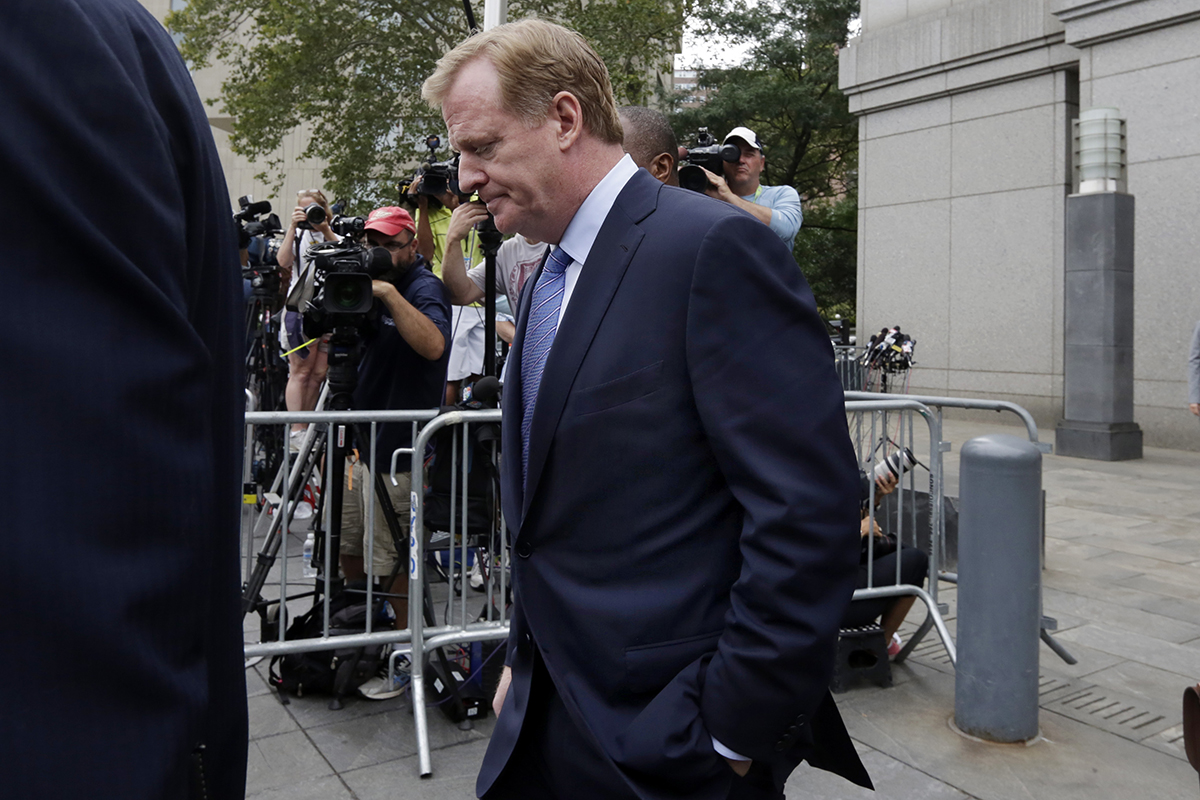The Deflategate Verdict Is a Victory for Common Sense

Photo via AP
It took more than seven months, but common sense finally won out in Deflategate.
Forget all of the legal reasons—of which there are plenty—as to why Judge Richard Berman overturned Tom Brady’s four-game ban Thursday. The crux of the case came to down to this: Brady was given the equivalent of a steroid suspension because a biased investigator determined it was “more probable than not” he was “at least generally aware” that two Patriots employees allegedly took a few hisses of air out of footballs in a game the Patriots won by 35 points. It was a ridiculous ruling then and remains a ridiculous ruling now. Nobody without an agenda could see it any differently.
The NFL’s only semblance of an argument was that Article 46 of the collective bargaining agreement gives the commissioner sweeping disciplinary powers. That’s true. But in a democracy, nothing ought to override fairness.
Brady was railroaded throughout this entire investigation, and Judge Berman says as much in his 40-page decision.
“The deference to an arbitrator does not extend so far as to require a district court to countenance, much less confirm, an award obtained without the requisites of fairness or due process,” Berman writes.
The litany of ways in which the NFL denied Brady due process is nearly too long to list. But let’s start with the fact that Brady was never told which part of his four-game suspension was for his presumed “general awareness” of the alleged ball deflation scheme, and which part was for his supposed noncooperation. When asked about this in court, all NFL attorney Daniel Nash could muster was a convoluted filibuster about how the CBA grants Goodell the power to basically do whatever he wants.
“I think the commissioner makes a judgment—and he says this in the award—he says taking the record as a whole, considering all of the factors, he determined that a four-game suspension was the appropriate sanction,” Nash said.
No player in the history of the NFL has ever been suspended for general awareness of another person’s misconduct or noncompliance. Vern Inge, a sports law attorney based out of LeClair Ryan’s Virginia office, says no employee can be disciplined for breaking rules without knowing what the consequences are.
“This relates to the ‘shop rules,'” Inge says. “If there is no precedent for that kind of discipline for the infraction, the violator isn’t on notice. It is not fair to subject someone to more severe punishment than would be expected for a violation of work rules.”
According to the NFL’s Player Policies, a first-time offense for equipment or uniform violations is subjected to a $5,512 fine. But the NFL punished Brady under the Competitive Integrity Policy, which is only found in the Game Day Operations Manual that is provided to club executives, but not players.
The NFL’s contention that Brady’s non-cooperation led to his suspension doesn’t stand up either. As Judge Berman notes in his decision, Wells said at Brady’s appeal hearing he “did not tell Mr. Brady at any time that he would be subject to punishment for not giving—not turning over the documents [emails and texts]. I did not say anything like that.”
Judge Berman also cites former NFL commissioner Paul Tagliabue’s arbitration ruling on Bountygate three years ago, in which Tagliabue said “there is no evidence of a record of a past suspension based purely on obstructing the League investigation.”
It’s debatable whether Brady even obstructed the NFL’s investigation at all. Wells said in a May 12 conference call that Brady answered every question during his interview and was “totally cooperative.” Though Brady didn’t give his personal cell phone to Wells, he did offer to help the league uncover any missing text messages. It’s also worth noting that Goodell didn’t hand over his phone to investigator Robert Mueller last fall when Mueller was investigating the NFL’s handling of the Ray Rice incident.
Any investigation or arbitration proceeding is supposed to include some fundamental aspect of fairness or impartiality. That wasn’t the case here. In his decision, Judge Berman points out that somewhere along the line, Wells’ law firm—Paul, Weiss, Rifkind, Wharton & Garrison—changed from being “independent” investigators to the NFL’s retained counsel. That is indicative of a stacked deck.
But perhaps the league’s biggest legal error in the arbitration hearing was not allowing Brady’s team to question NFL General Counsel Jeff Pash, who co-edited the Wells Report. Berman writes denying Brady the right to cross-examine a key witness was reason enough to vacate the entire Award on its own.
“The Court finds Commissioner Goodell’s denial of Brady’s motion to compel the testimony of Mr. Pash was fundamentally unfair,” Berman says. “Denied the opportunity to examine Pash at the arbitral hearing, Brady was prejudiced…and Commissioner Goodell’s refusal to hear such evidence warrants vacatur of the award.”
Goodell never had logic and rational on his side, and as it turns out, he didn’t have the law, either. It appears as if this whole Deflategate saga was nothing more than a desperate attempt for the commissioner to regain some of the credibility and power he has lost over the last couple of years.
It failed spectacularly.

